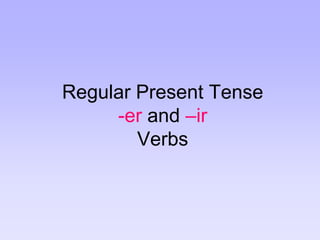Regular present-tense-er-ir
•Download as PPTX, PDF•
0 likes•1,960 views
Learn to conjugate regular -er & -ir verbs in Spanish
Report
Share
Report
Share

Recommended
More Related Content
What's hot
What's hot (20)
FRENCH VERBS IN IR PRESENT TENSE PART 2tense lesson

FRENCH VERBS IN IR PRESENT TENSE PART 2tense lesson
Similar to Regular present-tense-er-ir
Similar to Regular present-tense-er-ir (20)
More from mmmckay
More from mmmckay (11)
Regular present-tense-er-ir
- 1. Regular Present Tense -er and –irVerbs
- 2. There are three types of regular verbs in Spanish: verbs that end in –ar, verbs that end in –er, and verbs that end in –ir. You’ve already learned –ar verbs: yo hablo nosotros hablamos tú hablas vosotros habláis él, ella habla ellos hablan
- 3. Now for –er verbs: To form –er verbs, take off the –er and then add the following endings: comer (to eat) -o -emos como comemos -es -éis comes coméis -e -en come comen Notice that the only difference between –er verbs and –ar verbs is that you use e’s instead of a’s: -ar -er -o -amos -o -emos -as -áis -es -éis -a -an -e -en
- 4. Now for –ir verbs. Drop the –ir and add the following endings: abrir (to open) -o -imos abro abrimos -es -ís abres abrís -e -en abre abren Do you see what the difference is between –er and –ir verbs? They’re just alike except for the nosotros and vosotros forms: -er-ir -o -emos -o -imos -es -éis -es -ís -e -en -e -en
- 5. So the only difference between –ar verbs and –er verbs is that you use e’s instead of a’s in the –er verbs. And the only difference between –er verbs and –ir verbs is the nosotros and vosotros forms.
- 6. So when you’re conjugating verbs, be sure you know if the infinitive (the form ending in –ar or –er or -ir; e.g., hablar and comer and abrir are infinitives) ends with an –ar, –er, or –ir so you’ll know what ending to put on it: You talk: hablas HABLAR we talk: hablamos You eat: comes COMER we eat: comemos You open: abres ABRIRwe open: abrimos